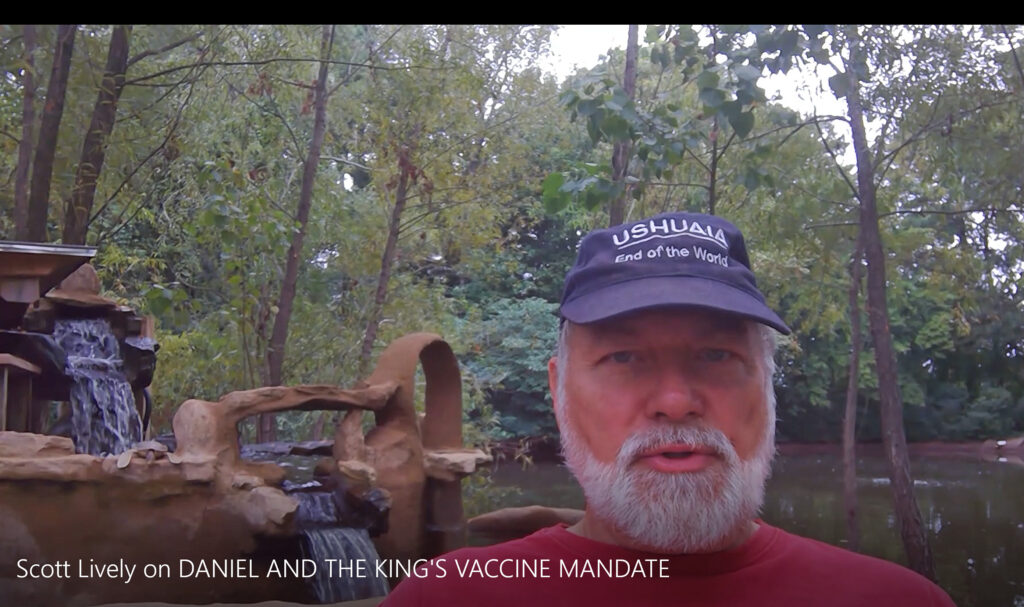
The very first test of Daniel the Prophet in the Bible book that bears his name was whether he would submit to a special “health” regime, mandated by Babylonian King Nebuchadnezzar:
“But Daniel made up his mind that he would not defile himself with the king’s choice food or with the wine which he drank; so he sought permission from the commander of the officials that he might not defile himself….The commander of the officials said to Daniel, ‘I am afraid of my lord the king, who has allotted your food and your drink; for why should he see your faces looking gaunt in comparison to the youths who are your own age? Then you would make me forfeit my head to the king.” But Daniel said to the overseer…‘Please put your servants to the test for ten days, and let us be given some vegetables to eat and water to drink…So he listened to them in this matter, and put them to the test for ten days. And at the end of ten days their appearance seemed better, and they were fatter than all the youths who had been eating the king’s choice food” (Daniel 1:8-15).
This passage seems a close parallel to the scenario of government health mandates that Christians are now facing across the world.
- The elites, represented here by Nebuchadnezzar, have their own ideas about what is best for the common people, and assume for themselves the right to impose their will by force.
- The particulars of the mandate, represented in Daniel 1 by certain foods and wine, are about whether or not to allow substances into one’s body against one’s will.
- The motive of the people (Daniel and his three companions) to resist the mandate is religious in nature.
- The government enforcement mechanism, represented by the Overseer, is coercive implementation by intermediaries such as private businesses which face serious penalties if they don’t serve as health police over their customers/clients.
- The solution, then as now, is a “request” for a religious exemption (backed by the implicit promise of civil disobedience).
- And in the end, just as has been proved by today’s non-vaxers, Daniel’s choice not to submit to the mandate was vindicated by his superior health status compared to those who did.
Daniel 1 provides a strong support for the Christian Doctrine of Bodily Sovereignty that our First Century Bible Church has codified in our campaign to provide personalized Religious Exemption letters to any Christian who requests one (see FCBible.org).
Here is a basic summary of the doctrine cited in our letter:
“Our Church believes in the absolute sovereignty of God in all things, and His delegation of authority to human beings over the control of their own minds and bodies (Colossians1:16–17; 1 Corinthians 6:19-20). We believe we possess both the God-given ability to reason and the gift of free will to make our own choices regarding our lives, inclusive of our health and well-being, and that individuals should be the ones to make their own decisions pertaining to any and all medical services and medications, including all decisions regarding vaccines no matter what conditions—including pandemics—may be present. The choice to use or accept any forms of external intervention to address any mental or physical health problem remains a sacred personal right, notwithstanding the opinion of other people, including medical professionals and government officials.”
As we have rolled out this program we have seen a variety of responses from the “Overseers.” Most grant the exemption as a matter of policy, in many cases apparently grateful to have the simple solution of putting a form in their files. Some try to push back against the exemption by forcing the requesting party to prove the sincerity of their religious belief. A few try to craft their “proof of sincerity” policy to be as restrictive as possible, with the apparent goal denying all requests while protecting themselves from the legal consequences.
The worst of this latter category is the attempt to tie the right of exemption to an official church dogma against all medicines. One hospital went so far as to require all religiously exempt employees to swear off Tylenol and Tums. In my view this is an unconstitutional effort to “establish religion” by defining what is “acceptable” church doctrine.
However, as stated above, our doctrinal position is rooted in God-given bodily sovereignty, not a dogmatic opposition to all medicines.
We have also seen efforts to force people to prove their religious sincerity by how often they attend church, and identifying where they attend church. The implication is that the lack of church attendance, or having an exemption from a non-local church is a disqualifier. We advice people who face this type of resistance to cite the government lockdowns to neutralize those objections. Most Christians had to move to an online church such as ours during the pandemic.
Ultimately, the crux of the religious exemption fight comes down to your sincerity of religious belief – something that cannot truly be known by anyone but you. But as a practical matter, evidence of sincerity is important. Our program has people formally register their agreement with our doctrine to receive a personalized letter on church stationary. That letter alone has been sufficient in most cases.
Where an employer-mandated additional form must be filled and signed by clergy, we have done that as well for registered members, some of whom report that their own local pastor refuses to do so. I find that shocking, since all that is required in most such cases is an attestation that the church member’s religious objection to the mandate is sincere. Why would any pastor refuse to attest to his own church member’s sincerity of belief?
Daniel set an excellent example for Christians today regarding “health” mandates that violate our right of bodily sovereignty. We should follow his example, while also remembering that Daniel’s first test was to prepare him for a second, tougher one (the fiery furnace) in which the mandate (for his companions) was to worship a gold statue of the king, spiritually equivalent to the Mark of the Beast.



